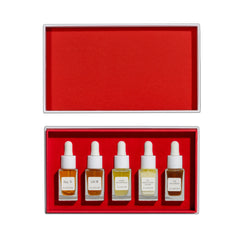Myths in skin care get their beginnings from an observation, and perpetuation of a misunderstanding from that observation.
The skin purge is an observation that after using certain products, a breakout will often happen. The misunderstanding of that observation is that a breakout is the body’s way of clearing, or 'purging' acne from the inside out.
Thats not how biology works.
If you have a whitehead, and resist the urge to pop it, it will go away with time. Your body doesn’t pop a whitehead on its own, but if you watch carefully you will see the whitehead shrink over days or a couple of weeks. The healing is going on from the inside because your immune system is working to clear up the clogged pore. And this takes more time than if you were to just pop the whitehead yourself because when you pop a whitehead you physically remove it, and trigger the acute immune response, which is fast, to attend to the new inflammation and resulting wound.

When you use a chemical exfoliant, whether it is a topical product, such as No. 9 or oral product, such as Accutane, an acne flare up is extremely common. Acne damages the skin, and that skin damage is not just on the very top of the epidermis, but deep in the dermal layer. The dead skin on the surface covers much of this damage and when you exfoliate, the dead skin is removed revealing the true damage beneath.

Acne flare ups also occur because the skin is damaged and not able to heal as quickly. However, with consistent use over many months, the skin will strengthen and the flare up will subside, usually permanently.
The only way to have a true acne flare up is with exfoliation because the only way to reveal damaged skin underneath is by taking off the top layer of skin.
A serum, a cleanser, a moisturizer, or any other product that does not exfoliate or cause cell turnover, that causes a ‘purge’, is really just a breakout. Damaging serums, harsh cleansers and clogging moisturizers cause inflammation, clogged pores, the weakening of skin and resulting bacterial/fungal/mold colonization, and all of the other factors that lead to acne.
Serums, cleansers, moisturizers and all other products that do not exfoliate are simply incapable of causing an acne flare up. So if you are experiencing whiteheads from these products, the products are damaging your skin.
And it may be time to consider throwing them away.
References:
Ingham, E., Eady, E. A., Goodwin, C. E., Cove, J. H., & Cunliffe, W. J. (1992). Pro-Inflammatory Levels of Interleukin-1α-Like Bioactivity Are Present in the Majority of Open Comedones in Acne Vulgaris. Journal of investigative dermatology, 98(6), 895-901.
Jeremy, A. H., Holland, D. B., Roberts, S. G., Thomson, K. F., & Cunliffe, W. J. (2003). Inflammatory events are involved in acne lesion initiation. Journal of Investigative Dermatology, 121(1), 20-27.
Kim, J., Ochoa, M. T., Krutzik, S. R., Takeuchi, O., Uematsu, S., Legaspi, A. J., ... & Sieling, P. A. (2002). Activation of toll-like receptor 2 in acne triggers inflammatory cytokine responses. The Journal of Immunology, 169(3), 1535-1541.
Layton, A. M., Morris, C., Cunliffe, W. J., & Ingham, E. (1998). Immunohistochemical investigation of evolving inflammation in lesions of acne vulgaris. Experimental dermatology, 7(4), 191-197.
Tanghetti, E. A. (2013). The role of inflammation in the pathology of acne. The Journal of clinical and aesthetic dermatology, 6(9), 27.


